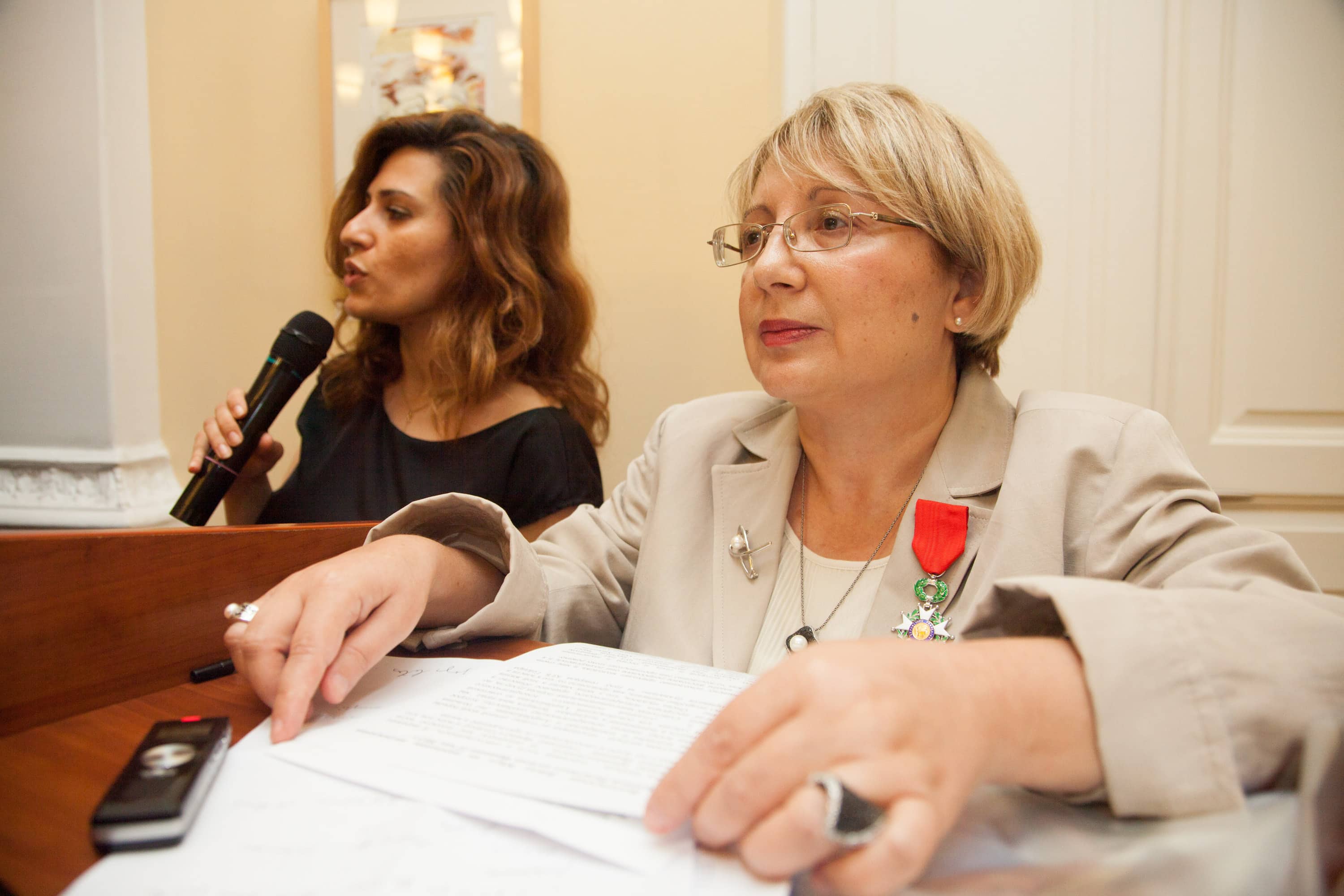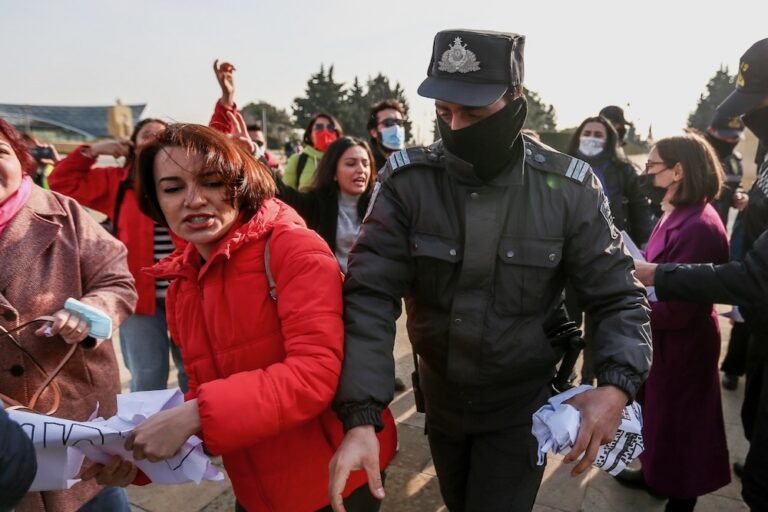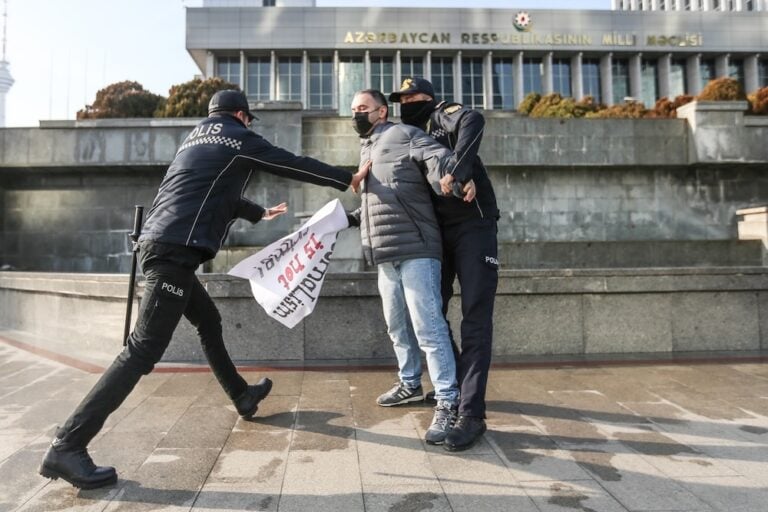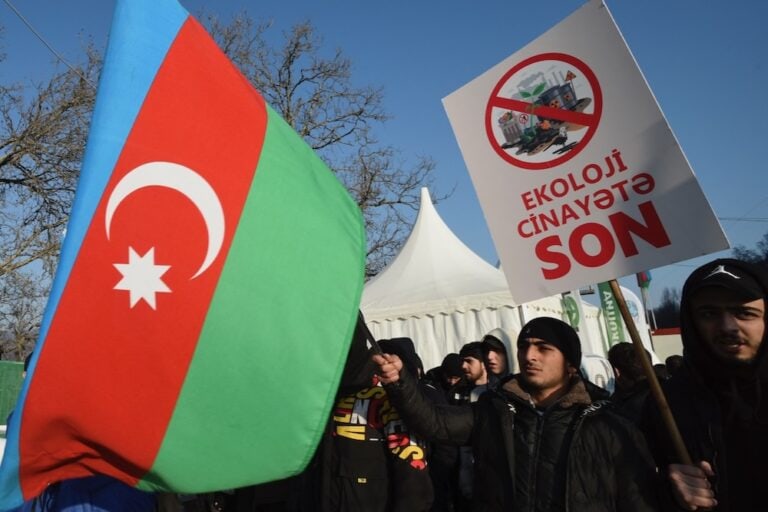The trumped-up legal assault on Yunus is the most recent in a host of troubling moves by the government that demonstrate how far Azerbaijan has strayed from international standards of human rights and rule of law.
The Institute for Reporters’ Freedom and Safety (IRFS) denounces the detention of prominent human rights defender Leyla Yunus and the treason charges brought against her and her husband, Arif, considering the move to be part of the severe persecution of civil society. This trumped-up legal assault on Yunus is the most recent in a host of troubling moves by the Azerbaijani government that demonstrate how far Azerbaijan has strayed from international standards of human rights and rule of law.
“Leyla Yunus is the latest victim of the Azerbaijani authorities’ merciless campaign of repression in the wake of the 2013 Presidential Election”, said IRFS CEO Emin Huseynov. The move comes on the heels of the presidential office-orchestrated campaign against civil society that has included a state-controlled media smear campaign; raids on NGOs; confiscation of equipment; the arrest of NGO bank accounts which led to de facto shutdown of several NGOs; the intimidation and legal pursuit of NGO workers inside and outside the country, including IRFS partners—International Media Support, IREX and National Endowment for Democracy.
“As the attack against civil society in Azerbaijan continues unabated, Azerbaijan’s partners need to take a stronger stand against regime’s systematic destruction of civil society and attempts to silence and marginalize critics,” continued Huseynov. “Specifically, we call for the steps that would impose a visa ban and asset freeze against Azerbaijani officials involved in gross human rights abuses.”
The raids – in which officials from the prosecutor’s office, tax inspectorate and Ministry of Justice comb through registration and financial documents –are being conducted under controversial amendments to the law, requiring NGOs to register their grants within Ministry of Justice.
While the Azerbaijani tax inspectorate and Ministry of Justice do have powers to supervise that non-profit entities comply with legislation in force, the context in which the current NGO inspections are being carried out – coupled with their scope and nature – can only create the impression that they are aimed at intimidating and putting pressure on NGOs, in particular those that benefit from foreign grants for public advocacy work on human rights and related issues.
Notably, state-affiliated NGOs and foundations, whose annual turnover [is] many times higher than the one of human rights NGOs, are not subject to any control or restrictions. In fact, they enjoy complete impunity for violations of Azerbaijan’s legislation which demands systematic reporting on income and operations.
The current wave of NGO inspections follows the adoption of a series of new laws negatively affecting Azerbaijan’s civil society since President Aliyev assumed
his third term in October 2013. Taken together, these laws have contributed to a seriously worsening climate for civil society.
Since President Aliyev assumed his third term in October 2013, we have witnessed a wave of repressive measures in the country that have sought to silence civil
society:
- The General Prosecutor Office has prohibited human rights activist Rasul Jafarov from leaving the country, a travel ban of which Jafarov himself was not informed. The human rights activist said that the sanctions against him are a retaliation from the authorities over the presentation of the report at the PACE session in Strasbourg in June on human rights violations in Azerbaijan.
- Hasan Huseynli, head of the Ganja-based Intelligent Citizen Enlightenment Center, was sentenced to 6 years in prison on July 14. The 57 year-old was convicted on fantastic charges of “armed hooliganism” and “unlawfully carrying a cold weapon”.
- On May 13, the Serious Crimes Investigation Department of the Prosecutor General’s Office, launched a criminal case (#142006023) against the number of foreign and local NGOs under Articles 308.1 (power abuse) and 313 (service forgery) of the Criminal Code of Azerbaijan Republic “on the fact of irregularities found in the activities of a number of NGOs of Azerbaijan Republic, and branches or representative offices of foreign NGOs”. At the moment, dozen of local NGOs de facto closed down due to the arrest of their bank accounts, with reference to the criminal case.
- Anar Mammadli, chairman of the Election Monitoring and Democracy Studies Center (EMDS) and Bashir Suleymanli, the executive director of the organization, were sentenced to 5.5 and 3.5 years in prison on May 26, 2014, which many believed to be in retaliation for their role in the exposure of election irregularities.
- Yet another package of draconian amendments to the NGO legislation were passed by parliament in December 2013 and signed by the president in February 2014. The legislation contains new provisions ensuring the control of NGO activities, imposes new requirements for NGOs in this regard, and establishes new offences and tougher penalties for NGOs. Among others, this legislation lays down stiff fines of several thousands of euros for offences such as failing to provide requested information to authorities about changes in registration information, obstructing efforts by authorities to check the compliance of NGOs with legislation in force, undertaking banking and other operations in relation to unregistered grants, and failing to conclude agreements with NGO volunteers.
As clearly seen from this chronology, Azerbaijan’s chairmanship in the Council of Europe’s top decision making body, its Committee of Ministers, goes hand in hand with the wave of crackdown against civil society – which is much harsher than in recent years. To this end, IRFS calls on Azerbaijan’s partners – the Council of Europe in particular – to speak out and call for an immediate end to these abuses.
We also appeal to the international community to stand firmly by Azerbaijan’s civil society at this time and to speak out against the new attempt to intimidate and discredit, in particular, groups that rely on foreign funding to promote respect for human rights and other universal values.



